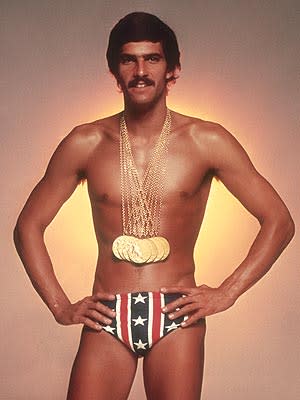Mark Spitz's seven-gold haul: part coronation, part redemption
For children of the 1970s, there were two iconic posters that could be found in American bedrooms.
One was of Farrah Fawcett, the "Charlie's Angels" heartthrob. The other was a swimmer, of all things.

It was Mark Spitz – hands on hips, smile wide, mustache thick, wearing nothing but a stars-and-stripes Speedo and seven gold medals around his neck.
No Olympian had ever won more golds at a single games than Spitz did in Munich in 1972. That was the great highlight in an Olympics otherwise darkened by murder and controversy.
Spitz's seven gold medals remained the record – the literal gold standard – until Michael Phelps did him one better in 2008. Phelps' pursuit of what Spitz accomplished became the central storyline in Beijing, riveting the nation.
But while Phelps got the record, he doesn't have a poster that speaks to an entire generation.
"My older sister was a swimmer, and I remember his poster being in her bedroom," said 1984 Olympian and current NBC commentator Rowdy Gaines. "I knew Mark Spitz for several years just because of that poster.
"Mark became a huge motivation for me. As soon as I started swimming I became a student of the sport, and he was a huge inspiration and motivation."
The Munich Games were the culmination of a youth's work for Spitz. He began setting national age-group records at 10 and seemingly was destined to dominate the sport at its highest levels from that time on.
[Yahoo! Sports Shop: Buy 2012 London Olympics gear]
Arnold Spitz even moved his family from its home in Sacramento, Calif., to Santa Clara to aid his 14-year-old son's swimming career in 1964. By 1966 and '67, Mark was winning national and international competitions.
But Spitz's landmark Olympic performance was part coronation and part redemption. After brashly predicting he would win six gold medals at the '68 Games in Mexico City, Spitz came home with two – both as a member of U.S. freestyle relays. His only other medals were a silver in the 100-meter butterfly and a bronze in the 100 freestyle. Forget becoming the most decorated swimmer in Mexico City; he wasn't even the most decorated American swimmer.
Shortly thereafter, Spitz dedicated himself to improving that performance. He enrolled at Indiana University and was coached by the legendary Doc Counsilman, becoming stronger and faster in preparation for Munich. By the time those Games started in late August of 1972, Spitz had an ambitious and exhausting plan to go for seven golds.
He was ready to dominate.
His first event was the 200 butterfly, and Spitz handily broke the world record and obliterated the competition, winning by more than two seconds to lead an American sweep of the medals. Euphoric after winning that race, Spitz had the confidence to maintain his high level of performance.
The next day he won the 200 freestyle, overtaking teammate Steven Genter in the final 50 meters to win by win by more than a second and break the world record by .73.
Two days after that, Spitz had his hardest workload. He won the 100 butterfly easily, by 1.29 seconds, and again eclipsed the world record. But he also had to swim on the 800 freestyle relay, anchoring a quartet that smashed the world record by more than seven seconds.
With four gold medals in hand, Spitz got some time to rest in advance of his toughest event, the 100 freestyle. Rumors percolated that he might withdraw against tough competition from his own team rather than jeopardize his clean sweep of golds, but Spitz went for it.
He was the third-fastest qualifier after the preliminary heats and third again after the semifinals, but rose to the occasion in the final. With his trademark rolling freestyle stroke and powerful kick, Spitz eased past top seed and fellow American Jerry Heidenreich by .43 seconds to win gold and set another world record.
All that remained after that was a pair of relays, the 400 medley and 400 freestyle, both of which proved anticlimactic. Spitz swam butterfly on a world-record setting medley relay and was the anchor on the free relay, which also easily took down the world mark.
Seven events. Seven gold medals. Even more remarkable – seven world records.
By modern standards the races look prehistoric. The men did not wear swim caps or goggles or high-tech suits. Spitz took it a step farther, refusing to shave his trademark mustache and keeping his dark hair long.
None of it slowed him down. It was by acclamation the greatest individual Olympic performance ever seen up to that time.
But it was not to be celebrated for long. Just hours after Spitz had won his last gold, Palestinian terrorists killed two members of the Israeli delegation and took nine others hostage in the Olympic village. Spitz, who is Jewish, was hurried out of the country. Later that same day, the nine hostages were killed in a rescue attempt.
Spitz eventually returned home to a hero's welcome and what was, by 1972 terms, a jackpot of endorsement dollars and celebrity appearances. His attempts at a Hollywood acting career were unsuccessful, as was an attempted comeback in the pool 20 years later.
But he'll always have those seven gold medals from Munich. And the iconic poster that came with them.
Other popular content on Yahoo! Sports:
• Elite Athlete Workouts video: U.S. gymnast Jonathan Horton uses odd workout supplement
• Chad Ochocinco enjoys the Dolphins' 'Brokeback Mountain' chemistry
• Mark Cuban loses $200,000 on Facebook stock, shrugs it off

 Yahoo Sports
Yahoo Sports 